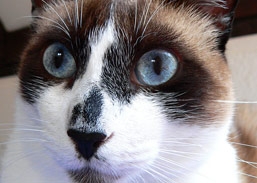Feline Leukemia (FeLV) is a virus found around the world that is passed by cat-to-cat contact through saliva, urine, feces and nursing. Cats that go outdoors are at the highest risk of contracting FeLV because cats tend to scuffle and the disease is commonly passed by a bite from an infected cat. If a cat does get FeLV it can cause blood disorders, immune deficiency and is a leading cause of feline cancer. Symptoms include decreased appetite, lusterless coat condition, enlarged lymph nodes, fever, pale gums, persistent infections and diarrhea. Your vet can test for FeLV using a simple in-house blood test. It is good practice to test all new cats before introducing them to your household if you already have other cats. If caught early enough some cats can fight it off with good supportive therapy. Once the virus infects the bone marrow the cat will likely have the disease for the rest of their life. Cats with this progressive stage of FeLV typically live less than 3 more years.
The good news is that outside of the body, FeLV can only survive for a few hours and vaccines are available. Talk to your vet about vaccinating your cats for FeLV because even indoor cats can get out or come into contact with other cats through screen windows. If you do have a FeLV positive cat, you should keep it housed separately from healthy cats and vaccinate all other cats in the household. Dogs and humans cannot contract the virus so FeLV positive cats can still have lots of (non-feline) companions.
Studies
Broadening the use of antiretroviral therapy: the case for feline leukemia virus.
Feline leukemia virus immunity induced by whole inactivated virus vaccination.
Epizootiology and management of the feline leukemia virus in the Florida puma.


